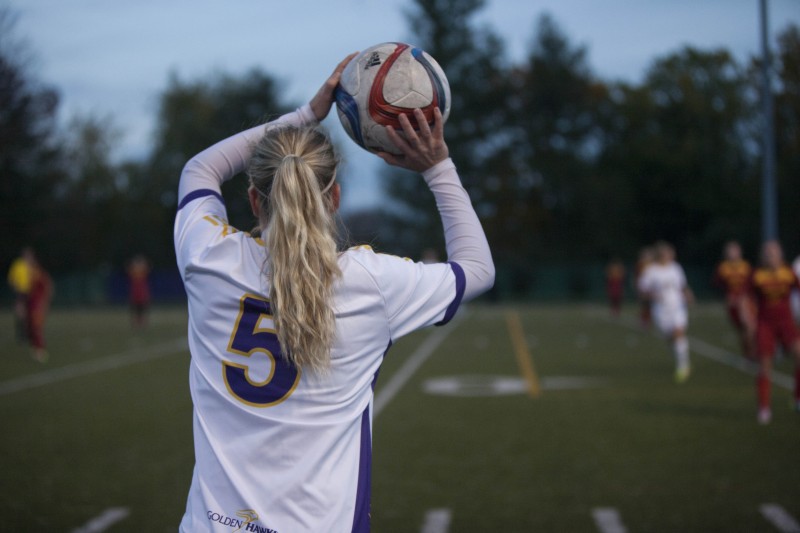The psychological effects of stopped play on student-athletes


Student-athletes are coming up on almost one year of stopped university-level sports. They are now adjusting to life without the intense physical demand of their sport and the close-knit community they have formed with their teammates.
As we approach the first anniversary of the COVID-19 pandemic, it has become clear that everyone has had to make significant social sacrifices to reduce the transmission. As a community, we have missed out on a lot this past year, including sports.
Student-athletes are now in the position of not playing the sport many have participated in since childhood. Sports psychologist and professor Dr. Wade Wilson, from the University of Waterloo, offered his perspective on the psychological effects of stopped play on student-athletes.
“With the reduced activity, student-athletes are feeling a lot of uncertainty, disappointment, hopelessness and some anxiety surrounding the unknown of the future,” Wilson said.
Wilson also works as a consultant for student-athletes who he helps with understanding the feelings they experience and how to manage them. He has offered some insight on what he enforces in student-athletes’ consultations.
“We are working on building perspective, confidence, a routine and adopting the right attitude—choose the attitude you want, and you can choose your perspective in any situation.”
With the ongoing pandemic, Wilson has focused his consulting on supporting student-athletes on what they have control over to try to minimize as many distractions as possible.
Wilson also helps his clients find the balance between controlling the controllable, which he explained to be thoughts, emotions and behaviours and day-to-day habits that increase the probability of achieving their performance goals
“I’ve been supporting highly-pressurized and emotional situations to help identify facilitated and debilitated thought habits, to recognize how our thoughts impact our emotions and in turn impact our behaviour and productivity.”
Controlling the controllable and focusing on progressive thought habits has become increasingly important during the COVID-19 pandemic as there are so many things we cannot control, especially when it comes to public health guidelines and lockdown orders.
Wilson explained the importance of being mindful of your situation: “When we start to get anxious and wonder about the ‘what if’s’ is when we become too outcome-focused. Acceptance and focusing on our self-talk and being present and aware in the moment.”
Laurier’s student-athletes may have channeled some of that into their academics. This fall term, they raised their average GPA to 8.10, a whole grade point higher than the 7.11 GPA from the previous fall term.
“With stopped play and lockdowns, student-athletes now have 20-25 hours a week they didn’t have before so some for some in this scenario may have turned their focus to controllable aspects of their studies.” Wilson said, speculating what motivated this academic focus.
For many of Laurier’s student-athletes, stopped play has meant a loss of part of their identities as competition is an integral part of athlete’s lives. The classroom has transformed into the field, where student-athletes focus their competitive nature on their schoolwork.
Student-athletes are also coming to terms with the lost social aspect of their sport, especially those who participate in team sports. They have gone from spending upwards of 20 hours a week with their teammates to only interacting with them in small bursts virtually.
“It will be a shock to the system and a feeling the loss of physical proximity and closeness to one another and can lead to a feeling of isolation.” Wilson said.
While student-athletes have been sidelined by the pandemic, junior and professional leagues are continuing to play. Watching sports continues for almost everyone but it can trigger anxieties and stress around why they are not participating in their sport.
Wilson suggested the emotional response invoked by watching the continued play “depends on the individual athlete, whether they are watching it because they want to or if they are watching to use it for training. It depends on the outcome they desire.”
By changing your thought process to utilize professional sports as a kind of guided imagery training rather than a stressor, student-athletes can work on their muscle memory of actions. Imagery has been considered to be the most widely used and successful mental skills training tool.
“There are a couple of theories that indicate when we visualize the perimeters, we have already established like the muscle memory ones, those systems are actually firing, it’s like we are doing the physical movement without moving.”
Wilson proposes student-athletes take part in imagery training by watching what is happening on the screen, then closing their eyes for a few minutes to recreate the image but with themselves in the scenario instead.
“It’s a way to get in some reps without actually doing any.”
Without traditional training facilities readily accessible, imagery training is useful in maintaining and excelling one’s physical and mental resilience for when play resumes for Ontario university student-athletes.

